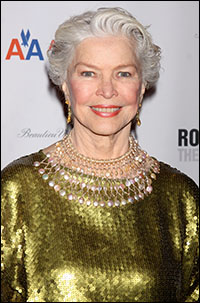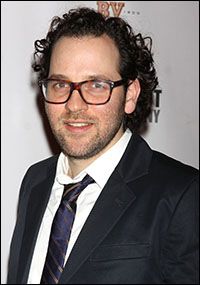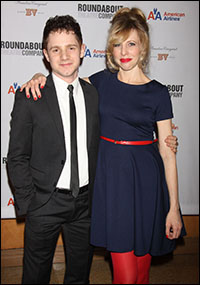
*
On Jan. 13, a month before the 60th anniversary of the original production, Roundabout Theatre Company pitched its second Broadway revival of William Inge's Picnic at its American Airlines Theatre. It was always a warming, welcome, out-of-season treat.
You never get to the picnic in Picnic. In fact, you never even get out of the shared backyard of Flo Owens and Helen Potts, and in this production these two ladies emerge the dominant, rock-solid pillars of the play — Flo, the voice of reason constantly going against the flow to keep her two independent-minded daughters in line, and Helen, "Mrs. Potts in name only," caring for an invalid mother who years before halted her elopement with the Potts boy ("Mrs. Potts" is a spiteful moniker).
Without undue stress or strain or turning the play on its head, these two supporting roles who are usually lost in the steamy goings-on of the younger folks have been strongly cast with Mare Winningham, in her first Broadway appearance, and Ellen Burstyn, in her eighth, and, accordingly, they are the last to take their curtain calls.
Around them, in Rings 1 and 3, are two different sets of lovers, old and young. The seniors are really old-marrieds without that piece of paper: spinster schoolmarm Rosemary Sydney dreading the next semester and confirmed bachelor Howard Bevans, who peddles notions, novelties and school supplies. Elizabeth Marvel and Reed Birney, best-known for terrific work Off-Broadway, received entrance applause from the opening night audience along with Winningham and Burstyn. The secret ingredient of this production is the set of young lovers who come from television — Sebastian Stan from "Political Animals" and Maggie Grace from "Lost." They respectively swaggered and slunk on stage without so much as a ripple, although it must be admitted that when he removes his shirt the audience is electric and that she manages with no effort at all easily to exude an idealized girl-next-door.
Over a long, hot, still-summer weekend in the early '50s — the Labor Day weekend — these storylines intersect and short-circuit. What Inge really wrote was a comedy — and Sam Gold's character-driven direction underscores this, but he also brings out the heart and pain that lurk in those laughs. You slowly begin to realize that this is a romance disguised as a comedy-drama when you start rooting for some good old-fashioned, guilt-free sex, which the stage hasn't seen a lot of lately.
Stan and Grace deliver those goods in spades, and director Gold admitted it was no problem. "They came with the chemistry," he said, rather modestly for a director.
Stan makes a manly presence of himself as Hal Carter, a college-dropout drifter who strolls into a small Kansas town and unnerves the ladies, eventually zeroing in on Madge Owens, Flo's eldest (Grace), despite the fact she's promised (sorta) to his fraternity brother, Alan Seymour (Ben Rappaport), the rich kid in town.
Grace, in a manner of speaking, is a product of Picnic. "It was my parents' favorite film," she said, "a big thing in my family." They've since divorced, but both showed up on opening night. Her Playbill bio ends thanking her parents, Rick and Valerie.
"We had fun tonight," she said of the cast. "We were really present to each other. It's a special group. There's a magic to that alchemy. I don't know what Sam did with casting, but it's a great group. We join hands before every performance."
Beyond beauty, there was a lot she wanted to bring out in Madge. "There's a longing with her, like there is with many of the other characters in the play. I think, with her, it's fun to find the places where she's not the classic ingénue — a vapid, gullible, sort of flotsam-and-jetsam person. There's something more. I think there's a sense that she's going to mess up her life, and she doesn't care who sees her do it, that he's her mistake, and, even if it is a mistake, at least it's her mistake. She doesn't have a lot of options but she really wants to forge her own path. I hope at the end we're having some complex feelings about the futures of each of the people in this play."

Buy this Limited Collector's Edition |
When Marvel steps center-stage in her smartly tailored suit, with its sensible chapeau, she is the spitting image of Eileen Heckart, the original Rosemary. She, of course, didn't see that performance, but she did see Rosalind Russell in the movie version, and, if she seems to be applying her beauty cleanser a little too sensually as she is watching the shirtless Hal, you can count that as a little homage to Roz.
The famous proposal scene that begins Act Two, where she sandblasts a commitment out of her Howard, is tour de force stuff. "I love what a fighter Rosemary is. I love that she just goes after what she wants and makes it happen. That scene is like music, really. You just begin with a note, and you play it through. The scene plays itself because the writing is so perfect."
As her reluctant and then resigned groom, Birney gets the longest laugh of the night, grudgingly carting her luggage to the honeymoon getaway-car. "It's pretty consistently a big, big laugh," he admitted. "The audiences have been so wonderful, and it's very gratifying to see people respond. I've never played anybody like Howard. I'm usually playing neurotic East Coast people. He's a very simple guy, leading a very unexamined life, and it's a very different kind of a part for me. I love it."
Incredibly, this is Birney's first Broadway show since his debut in 1977's Gemini — he has been working prodigiously (and prize-winningly) Off-Broadway — and he had to get in step. "It's a muscle that I have not used in a long time. You gotta have some size to fill that room. Uncle Vanya [at Soho Rep in 2012] had 77 seats. This has 750 so it's a big difference."
 |
||
| Ellen Burstyn |
||
| Photo by Joseph Marzullo/WENN |
Winningham, one of the more grounded of The Brat Pack introduced in 1985's "St. Elmo's Fire," has turned into wonderful mother material, trying to steer her daughter away from her own mistakes. "You don't really find out until the last minute and a half about her pain," she said, "and it comes in one line of dialogue."
Hers is a notable Broadway bow. "God bless Sam Gold for getting me here."
A similar sentiment was expressed by Maddie Corman, who plays one of Rosemary's school-teaching cohorts, Irma Kronkite. "Rehearsal was like a master class with Sam Gold. I felt like I was back in school in the best possible way. He's brilliant, and all his notes made me want to read more and learn more."
The original Irma was played by the plus-sized Reta Shaw, but Gold didn't see her that way. "I love that he wanted me to do it and didn't worry about it. Irma is Irma, and he saw some sadness in me that was not about being a certain age or a certain size."
 |
||
| Sam Gold |
||
| photo by Joseph Marzullo/WENN |
"You'll know the answer to this," said Jane Alexander, swooping me into an intermission brain-stumper that was stalling her husband, director Ed Sherin, and producer Liz McCann. "Who played Madge in the original production?" I told her Janice Rule, and relief settled over the group. Alexander, there in support of daughter-in-law Corman, remembers that production. "I was a teenager, and all my focus was on Kim Stanley [playing Madge's smarter, more daring kid sister]."
 |
||
| Chris Perfetti and Maddie Corman |
||
| Photo by Joseph Marzullo/WENN |
One last kudo: In an evening filled with shading and nuance, it was nice to note this was followed through to the smallest role. It's an annoying gnat of a role and might be ignored by critics, but Chris Perfetti (in yet another Broadway debut) is a dead-on "Bomber" Gutzel, the oversexed paperboy with delusional dreams of Madge.
The first "Bomber," Morris Miller, is the only male member of the original cast still alive. So's the understudy who found a husband in the cast: Joanne Woodward.
The only original cast member attending the opening was 91-year-old Elizabeth Wilson, who played the new teacher in town, Christine Schoenwalder, the female hygiene instructor who pointedly looked the other way when Hal bared his chest.
She was mellow and nostalgic after the play. "It was a very happy experience for me, remembering a lot of the actors who became my friends like Eileen Heckart and Kim Stanley and Paul Newman and dear Joshua Logan, who directed it," she remarked. "That was Josh's version of Picnic we saw tonight. What happened was he decided to change the ending of the play. Inge's original ending was Madge staying. She didn't run off with Hal, but Josh told him he was going to change it. I don't know legally how he got away with it, but, in those days — 1953 — Josh Logan could change the ending and did. I think Inge's ending was less sad. People call this the happy ending, her going off with Hal. God Almighty, what's going to happen? I'm sorry. I don't think that's a happy ending. When William Inge actually saw it on stage — I'll never forget it — he walked up the aisle, and we never saw him again. He was devastated."
But the devastation wasn't forever, evidently. There's nothing like the Pulitzer Prize and The New York Drama Critics' Circle Award to bring a playwright to his senses.
When the play was published to promote the film version, which won Oscar nominations for Best Director (Logan, in his film debut) and Best Picture, Inge's dedication was "To Joshua Logan, Who gave unsparingly of himself in helping me to realize the play. I shall be always grateful."



























































































